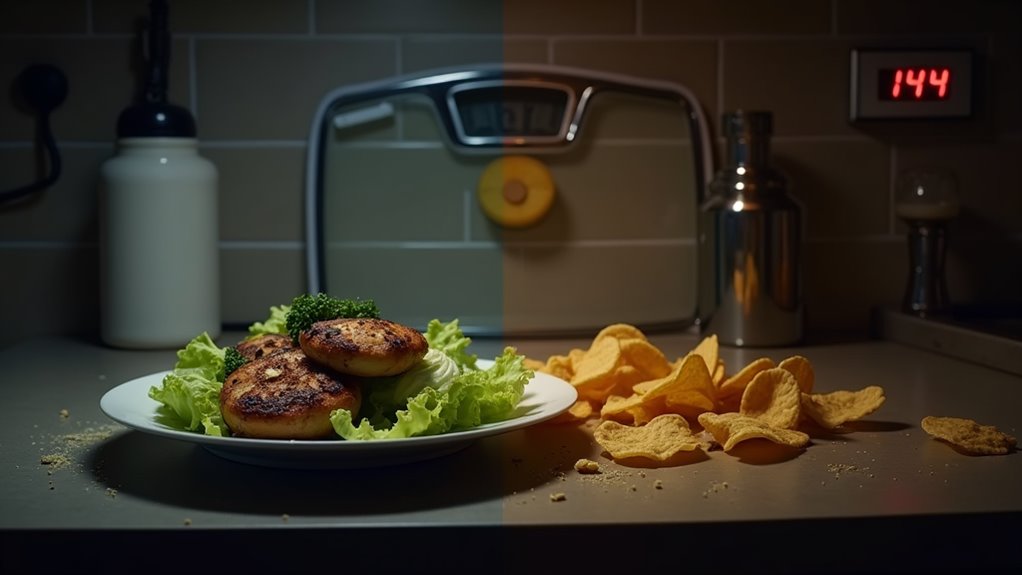The TRUTH About Late-Night Snacking – Can You Still Lose Weight.
You’ve probably heard it before – eating late at night will make you gain weight. But what if that’s not entirely true? While countless diet experts warn against midnight snacks, emerging research suggests the relationship between evening eating and weight gain isn’t so clear-cut. Understanding the real impact of late-night eating can transform how you approach your weight loss journey and free you from unnecessary food restrictions.
The Science Behind Late-Night Eating and Weight Gain
Although many people believe eating late at night automatically leads to weight gain, the relationship between meal timing and body weight is more complex than that.
When it comes to late-night snacking, weight loss isn’t determined by the clock, but rather by your total daily calorie intake and the quality of food you’re consuming.
Your body doesn’t simply stop processing calories after a certain hour. Instead, it continues to burn energy throughout the night, though at a slower rate.
What often makes late-night eating problematic is that you’re more likely to make poor food choices when tired or stressed, leading to excess calorie consumption.
Research shows that nighttime eating can affect your circadian rhythm and metabolism, but it’s not the timing itself that causes weight gain.
You can still achieve your weight loss goals with evening meals if you’re mindful of portion sizes and choose nutrient-rich foods. Additionally, maintaining a caloric deficit throughout the day is essential for effective weight management.
Common Myths About Evening Snacking Debunked
When you hear advice about late-night eating, you’ll likely encounter several persistent myths that have been circulating for years.
Let’s set the record straight on these common misconceptions that might be holding you back from reaching your weight loss goals.
First, your body doesn’t automatically store food as fat just because you eat after 6 PM. What matters most is your total daily calorie intake, not the timing.
Another myth is that eating at night slows your metabolism – it doesn’t. Your metabolic rate follows your circadian rhythm but doesn’t shut down during evening hours.
You’ve probably also heard that late-night snacking always leads to poor food choices. While it’s true that many people tend to reach for less healthy options at night, you can make smart choices any time of day.
Planning your evening snacks and keeping healthy options readily available can help you stay on track with your weight loss journey. Additionally, sleep deprivation can increase cravings for high-calorie foods, making it vital to prioritize rest for effective weight management.
How Meal Timing Affects Your Metabolism
Despite popular beliefs about strict meal schedules, your metabolism doesn’t operate like a simple on-off switch throughout the day. Instead, it’s a complex system that continuously processes nutrients, regardless of when you eat.
Your body’s metabolic rate does experience natural fluctuations based on your circadian rhythm. You’ll typically have higher metabolic efficiency during daylight hours, but that doesn’t mean nighttime eating automatically leads to weight gain. What matters most is your total daily caloric intake and the quality of food you’re consuming.
When you eat consistently throughout the day, you’re supporting your body’s natural metabolic processes. You’ll feel more energized and less likely to overeat later. Additionally, ensuring you get adequate sleep is crucial for maintaining a healthy metabolism and supporting weight loss efforts.
If you’re hungry at night, it’s perfectly fine to have a small, nutrient-dense snack. Just be mindful of portion sizes and choose foods that combine protein and complex carbohydrates to support your weight loss goals.
Smart Late-Night Snack Options for Weight Loss
Choosing the right late-night snacks can make a significant difference in your weight loss journey. If you’re craving something before bed, opt for protein-rich, low-calorie options that won’t spike your blood sugar or disrupt your sleep.
Greek yogurt with berries offers protein and antioxidants while keeping calories in check. A small handful of nuts, particularly almonds or walnuts, provides healthy fats and protein that’ll help you feel satisfied.
If you’re in the mood for something warm, try a cup of caffeine-free herbal tea with a slice of turkey breast.
For those with a sweet tooth, cottage cheese with a drizzle of honey or a small apple with peanut butter can satisfy cravings without derailing your progress. Additionally, incorporating high-protein snacks like cottage cheese or hard-boiled eggs can enhance your satiety and support your weight loss efforts.
These snacks are part of the successful weight-loss community’s toolkit because they’re filling, nutritious, and won’t lead to overnight weight gain when consumed in moderation.
Creating a Sustainable Evening Eating Schedule
To maintain consistent weight loss, establishing a regular evening eating schedule is just as crucial as choosing the right foods. You’ll find greater success by setting a consistent cutoff time for your last meal or snack, ideally 2-3 hours before bedtime. This allows your body to properly digest food while you’re still active.
Start by planning your dinner between 6:00 and 7:00 PM, giving your body time to process nutrients before sleep. If you need a small snack later, keep it under 200 calories and eat it no later than 8:30 PM. Calories consumed at night can add up quickly and complicate weight maintenance, so being mindful of your evening habits is essential.
You’ll soon notice that other people who’ve achieved their weight loss goals follow similar patterns.
Track your eating schedule in a food diary or app, and you’ll quickly identify patterns that work best for your lifestyle.

